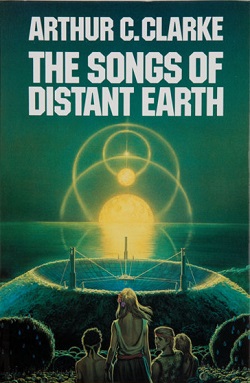With The Songs of Distant Earth, Arthur C. Clarke wanted to tell a realistic science fiction story about long distance space travel and interplanetary relations. It was written partly in reaction to the fantasy science fiction of Star Trek and Star Wars, which were both popular when Clarke wrote this. Star Trek and Star Wars are great entertainment, mainly because they have some excellent stories and enjoyable characters. The Songs of Distant Earth does not have a very engaging cast of characters, nor does it have a particularly engaging storyline. It's at its best, however, when it makes readers pause to think about such wonders as the realities of space travel or the terror of a helpless population facing inevitable destruction by the expanding sun. This isn't a despairing novel, however, but one of hope and faith in the adaptability of the human race.
In Clarke's fictional tale, 20th century scientists discover signals radiating from the sun that predict its demise by the year 4000. This didn't alarm most of humanity right away, but as time advanced nearer, people realized they needed to act more quickly. Scientists sought out planets that might sustain human life if conditioned just right. Seedships were sent out, commandeered by robots and stocked with all of the pertinent knowledge these new men and women would need to know in order to begin again. These planets were hundreds of years away, so humanity had to be patient to await the news of success. Meanwhile, scientists were frantically trying to figure out faster means of space travel and people were growing increasingly hedonistic, or increasingly religious, whichever suited their needs.
The planet of Thalassa was one such planet chosen for colonization, and with the exception of a tiny landmass, it was a perfect place. It was among the first, colonized in about 2900, and surviving still for 700 years due to its wise leaders and non-violent people. Population control measures were also necessary to reduce strain on the planet's resources. Among the Thalassans is Brant, an engineer who is frustrated that his fish traps keep getting sabotaged. Mirissa is his girlfriend, and she, it seems, is also the most knowledgeable Thalassan on the planet, having read most everything handed down from the mothership (where they originated). Mayor Waldron is a middle-aged lady who oversees South Island, and she also has a sexual appetite with a special interest in Brant.
One day this planet's peaceful operations are interrupted by the visitation of an alien ship. From this ship step two men who claim they have come from Earth. These men are Loren Lorenson, ship commander, and Moses Kaldor, ship ambassador. Apparently Earth did figure out how to create improved space travel using the quantum drive. The quantum drive uses the vacuum of space to propel it forward and can move for an unlimited amount of time. It can't approach the speed of light, just one-twenthieth of the speed of light, and that's one of the points Clarke wanted to make. People cannot approach the speed of light. That means no warp speed a la Star Trek or Star Wars. After 200 years of travel the ship, called the Magellan, arrives at Thalassa because it needs ice. Yes, ice. Ice is the best asteroid shield in space, but after 200 years of travel the crew of the Magellan are worried they don't have enough of a shield to make it to their destination, still 300 years away, of Sagan Two.
So the humans from Earth and the Thalassans socialize together as the Magellan does its work of making ice and raising it to form the ice shield, a two year process. This is where the novel becomes less compelling, broken into a series of mini-events, most of them unconnected. Loren and Mirissa of course fall in love, but Brant doesn't seem too upset about this. There's a discovery of some strange lobster creature in the sea, Mayor Waldron hitting on Loren, a mutiny aboard the Magellan, conversations between Moses and Mirissa about Earth, Mirissa's brother Kumar developing a close bond with Loren, and so on and so forth. The drama is hardly compelling and mostly boring. These people are way too nice. This is great
for the hopes for humanity's future, to be sure, but when I'm reading a novel I want a little more tension, conflict, and cohesion than this novel has to offer.
So while Clarke offers this up as a realistic version of those fantasy sci-fi blockbusters of Star Wars and Star Trek, it is hardly their equal. The story is very compelling for the first third, on and off compelling for the next third, and then dull for the last third. I can understand and appreciate a good sci-fi story that doesn't make use of lightsabers and phasers set to stun and amped-up action scenes. I can appreciate a good piece of speculative fiction, giving realistic thought to what could possibly happen to humanity in case the sun blew up. It's a frightening thought to see that everything mankind has created could just melt away, but there is some comfort in realizing that doesn't have to be the end. Mankind just might be able to continue on after all. There was a part of me, while reading this, that wanted to be among the crew of the Magellan, hibernating for hundreds of years and waking up to find myself in a whole new world, and that's how evocative this novel was when it came to its big ideas.

No comments:
Post a Comment